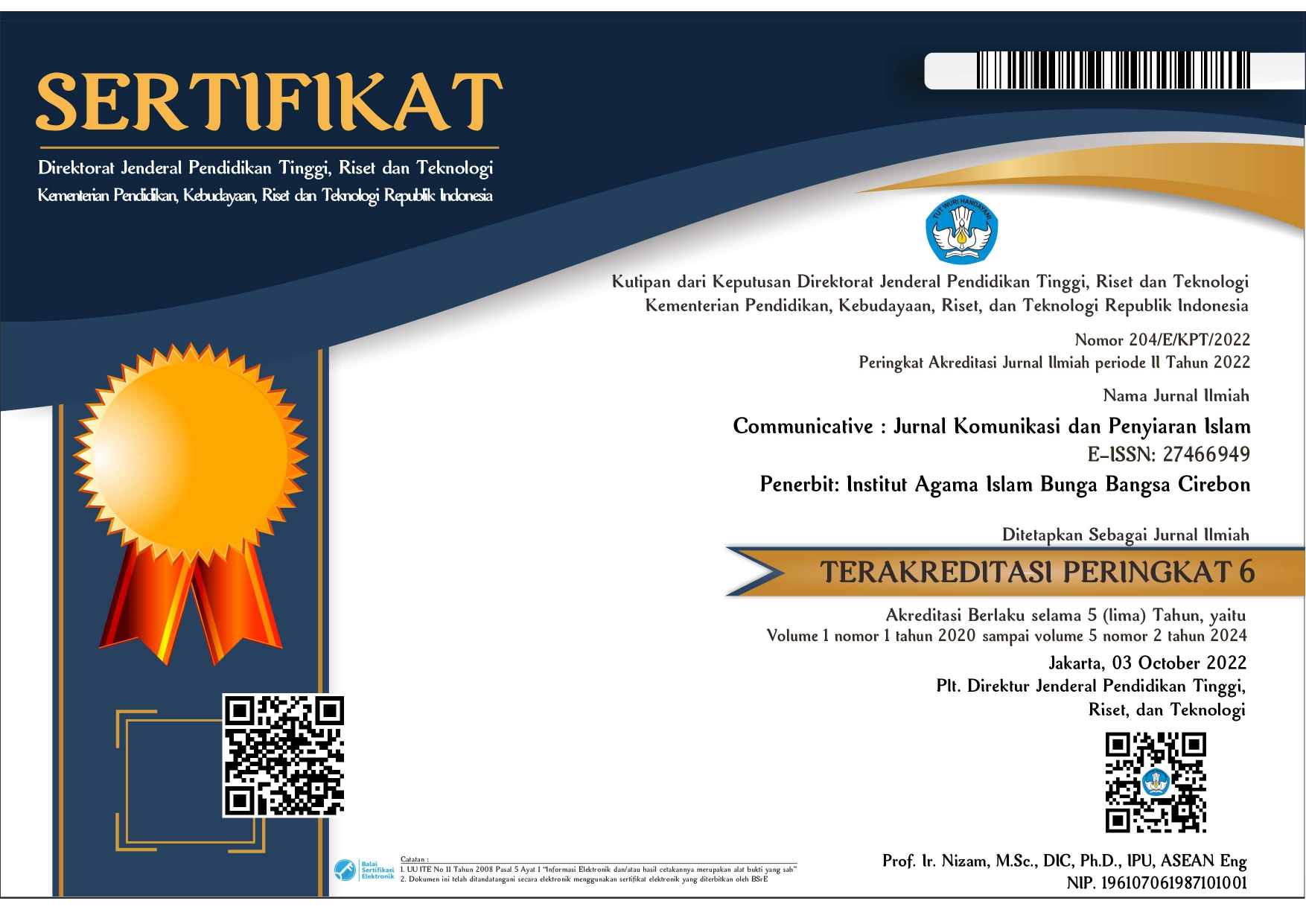KAJIAN LITERATUR SISTEMATIS TEORI PERTUKARAN SOSIAL DALAM HUBUNGAN DUA ARAH
Abstract
Social exchange theory (SET) is often perceived as a theory that only considers the profit-and-loss aspects of a two-way relationship. This theory is suspected of not considering other aspects, such as emotions and ethics, in viewing a relationship. Therefore, this study was conducted to prove the suspicion of social exchange theory. The study was conducted by collecting journal articles that have discussions related to social exchange theory, either as the main discussion or have issues related to the theory. Of the 44 journal articles reviewed, the results show that most of the research can be divided into 7 categories, namely educational institutions, tourism, marketing, management, psychology, public relations, culture. Management is the most category in the use of social exchange theory.. This finding corroborates that social exchange theory is stronger in the cost-benefit aspect in a two-way relationship.
Keywords: Social exchange theory, dyad relationship, reward and cost, reciprocity
Downloads
References
Badjie, G., Thoyib, A., Hadiwidjojo, D., & Rofiq, A. 2019. Introducing new employee empowerment approach: A systematic literature review. Humanities and Social Sciences Reviews, 7(5), 696–706. https://doi.org/10.18510/hssr.2019.7585
Bari, M. W., Abrar, M., Shaheen, S., Bashir, M., & Fanchen, M. 2019. Knowledge Hiding Behaviors and Team Creativity: The Contingent Role of Perceived Mastery Motivational Climate. SAGE Open, 9(3). https://doi.org/10.1177/2158244019876297
Blau, P. M. 1964. Exchange and Power in Social Life. New York: John Wiley.
Brass, D. J., Galaskiewicz, J., Greve, H. R., & Tsai, W. 2004. Taking Stock Of Networks And Organizations: A Multilevel Perspective. In Academy of Management Journal (Vol. 47, Issue 6).
Cook, K. S., & Emerson, R. M. 1978. Power, Equity and Commitment in Exchange Networks Power, Equity And Commitment In Exchange Networks. In Source: American Sociological Review (Vol. 43, Issue 5).
Cropanzano, R., & Mitchell, M. S. 2005. Social exchange theory: An Interdisciplinary review. In Journal of Management (Vol. 31, Issue 6, pp. 874–900). https://doi.org/10.1177/0149206305279602
Dainton, M., & Zelley, E. D. (n.d.). Applying Communication Theory for Professional Life: A Practical Introduction.
Davis, J., Mengersen, K., Bennett, S., & Mazerolle, L. 2014. Viewing systematic reviews and meta-analysis in social research through different lenses. SpringerPlus, 3(1). https://doi.org/10.1186/2193-1801-3-511
Frisby, B. N., Sidelinger, R. J., & Booth-Butterfield, M. 2015. No Harm, No Foul: A Social Exchange Perspective on Individual and Relational Outcomes Associated With Relational Baggage. Western Journal of Communication, 79(5), 555–572. https://doi.org/10.1080/10570314.2015.1075585
Gouldner, A. W. (1960). American Sociological Review The Norm Of Reciprocity: A Preliminary Statement * (Vol. 25, Issue 2).
Griffin, E. M., Ledbetter, A., & Sparks, G. (n.d.). A First Look At Communication Theory Tenth Edition. New York: Mc-Graw-Hill.
Jian, G., & Dalisay, F. (2017). Conversation at Work: The Effects of Leader-Member Conversational Quality. Communication Research, 44(2), 177–197. https://doi.org/10.1177/0093650214565924
Sunyoto, D., Tjahjono, H. K., el Qodric, Z. M., Prajogo, W., & Hadi, S. 2021. Group Engagement Based On Social Exchange Theory: Antecedents And Consequences. Journal of Leadership in Organizations, 3(1). https://doi.org/10.22146/jlo.57001
Snyder, H. 2019. Literature review as a research methodology: An overview and guidelines. Journal of Business Research, 104, 333–339. https://doi.org/10.1016/j.jbusres.2019.07.039
Thibault, J. W., & Kelley, H. H. 1959. The social psychology of groups. New York: John Wiley.

This work is licensed under a Creative Commons Attribution 4.0 International License.















